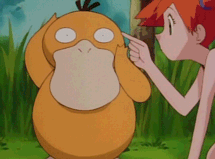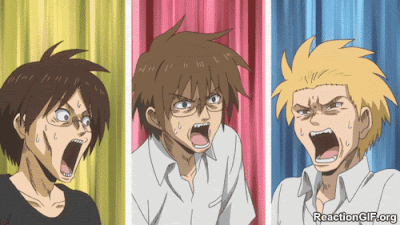Day 112-119 & FINALS WEEK: おはようございます。ぜんぶきまつしけんをしました!私はとてもうれしいです。
フロリダしゅうはさむくありません。だからフロリダしゅうにいきます。
じゃあ、また。
Saturday, December 16, 2017
Friday, December 8, 2017
Friday, December 1, 2017
Sunday, November 19, 2017
Sunday, November 5, 2017
Saturday, October 28, 2017
Day 62-70 & Freezing Indiana Weather: こんげつはフリージングだ!!!
私:きさまはあまりにさむいだ!
きしょう:ははあ!あまりにさむいだね。いまたったゼロせっしだ。君はじゃくしゃだね。
私:あああ!おれはフロリダじんだ。きさまはフロリダにいない。フロリダじんはきらいさむけだ。
きしょう:そうだか。そうだか。おれはマイナス三十八せっしのきしょうをつくる。ははあ!
きしょう:きさま。。。💀
私:あーあ。いよいよあたたかいだ。。。
Terms:
だ= less polite form of です
たい(対)= versus
きしょう(気象)= weather
きさま(貴様)= you (bastard)
あまりに= too
たった= merely
せっし(摂氏)= degrees celsius
じゃくしゃ(弱者)= weak person
さむけ(寒気)= cold
つくります(作ります)= u-verb: to make
いよいよ = at last; finally
あたたかい(暖かい)= warm
じゃあ、また。
私たいきしょう
私:きさまはあまりにさむいだ!
きしょう:ははあ!あまりにさむいだね。いまたったゼロせっしだ。君はじゃくしゃだね。
私:あああ!おれはフロリダじんだ。きさまはフロリダにいない。フロリダじんはきらいさむけだ。
きしょう:そうだか。そうだか。おれはマイナス三十八せっしのきしょうをつくる。ははあ!
きしょう:きさま。。。💀
私:あーあ。いよいよあたたかいだ。。。
Terms:
だ= less polite form of です
たい(対)= versus
きしょう(気象)= weather
きさま(貴様)= you (bastard)
あまりに= too
たった= merely
せっし(摂氏)= degrees celsius
じゃくしゃ(弱者)= weak person
さむけ(寒気)= cold
つくります(作ります)= u-verb: to make
いよいよ = at last; finally
あたたかい(暖かい)= warm
じゃあ、また。
Friday, October 20, 2017
Day 55-61 & Dialogue on Tour Sites:
クラスメートのなまえ:ニさん
かいわのタイトル:えどじょうとしんかんせん
ニさん:日本語になにがありますか?
私:そうですね。えどじょうがあります。そしてしんかんせんもありますよ。
ニさん:そうですか。えどじょうはなにがありますか?
私:それはとくがわばくふのうちがありました。ゆうめいなしろですよ。
ニさん:しりませんでした。大きいですか?
私:え~と、とても大きいです。
ニさん:えどじょうはきょうとにありますか?
私:いいえ、とうきょうにありますよ。
ニさん:ああそうですか。でも、しんかんせんってえいごでなんとですか?
私:ああ、BULLET TRAINですよ。それはとてもはいやいです。
ニさん:そうですか。しんかんせんはどこに日本にありますか?
私:いち、ほくりくちほうにあります。それはほくりくしんかんせんとよばれます。
ニさん:ああそうですか。おもしろい。
Terms:
えどじょう(江戸城)= Edo Castle
しんかんせん(新幹線)= bullet train
とくがわばくふ(徳川幕府)= Tokugawa Shogunate
しろ(城)= castle
しります(知ります)= ru-verb: to know
はやい(早い)= i-adjective: fast
ほくりくちほう(北陸地方)= Hokuriku region (west Japan)
よばれます(呼ばれます)= ru-verb: to be called (a name); to be referred to as
じゃあ、また。
クラスメートのなまえ:ニさん
かいわのタイトル:えどじょうとしんかんせん
ニさん:日本語になにがありますか?
私:そうですね。えどじょうがあります。そしてしんかんせんもありますよ。
ニさん:そうですか。えどじょうはなにがありますか?
私:それはとくがわばくふのうちがありました。ゆうめいなしろですよ。
ニさん:しりませんでした。大きいですか?
私:え~と、とても大きいです。
ニさん:えどじょうはきょうとにありますか?
私:いいえ、とうきょうにありますよ。
ニさん:ああそうですか。でも、しんかんせんってえいごでなんとですか?
私:ああ、BULLET TRAINですよ。それはとてもはいやいです。
ニさん:そうですか。しんかんせんはどこに日本にありますか?
私:いち、ほくりくちほうにあります。それはほくりくしんかんせんとよばれます。
ニさん:ああそうですか。おもしろい。
Terms:
えどじょう(江戸城)= Edo Castle
しんかんせん(新幹線)= bullet train
とくがわばくふ(徳川幕府)= Tokugawa Shogunate
しろ(城)= castle
しります(知ります)= ru-verb: to know
はやい(早い)= i-adjective: fast
ほくりくちほう(北陸地方)= Hokuriku region (west Japan)
よばれます(呼ばれます)= ru-verb: to be called (a name); to be referred to as
じゃあ、また。
Friday, October 13, 2017
Wednesday, October 4, 2017
Saturday, September 30, 2017
Day 41 & KATAKANA for English Words: こんばんは。
わたしはにっけいをよみました、そしておもしろいカタカナをみいだしました。
https://www.nikkei.com/
The Nikkei, headquartered in Tokyo, is the world's largest circulating finance newspaper. The following are KATAKANA words I found. You can see the business theme of those words. I found that 1/5 of words were written in KATAKANA especially for foreign topics, but less so for domestic topics. The vast majority of words were written in KANJI, unfortunately.
グーグル = Google
パソコン = Personal Computer
スマートフォン = Smart Phone
ロックスター = Rock Star
リベラル = Liberal
インフラ = Infrastructure
ソフト = Software
マーケット = Market
オピニオン = Opinion
わたしはにっけいをよみました、そしておもしろいカタカナをみいだしました。
https://www.nikkei.com/
The Nikkei, headquartered in Tokyo, is the world's largest circulating finance newspaper. The following are KATAKANA words I found. You can see the business theme of those words. I found that 1/5 of words were written in KATAKANA especially for foreign topics, but less so for domestic topics. The vast majority of words were written in KANJI, unfortunately.
グーグル = Google
パソコン = Personal Computer
スマートフォン = Smart Phone
ロックスター = Rock Star
リベラル = Liberal
インフラ = Infrastructure
ソフト = Software
マーケット = Market
オピニオン = Opinion
Fun Video on Pronunciation of English Words in Japanese, Korean, and Chinese
Terms:
みいだします(見出します)= u-verb: to find
じゃあ、また。
Friday, September 29, 2017
Tuesday, September 26, 2017
Saturday, September 23, 2017
Day 31-33 & My Weekends: こんにちは。こんしゅう、私はたいへんひまがないがありました。たおていごぜん四じごろねいました。
私のしゅうまつ:
私はたいていきんようびからどようびの十三じかんにねます。そして、ごご一じにおきます。
どようびの一じはんにひるごはんをたべますでも、ぜんぜんあさごはんたべません。だいがくの一ばんにあさごはんをたべました。そのあと、マッカートニーホールでしゅくだいをしますでも、にちようびからもくようびにとしょかんでべんきょうします。どようびのばんにばんごはんをたべすま。そして、ときどきアニメをみます。
Terms:
たいへん = very
ひまがない = busy
そのあと = after
マッカートニーホール = McCourtney Hall
ジークフリードホール = Siegfried Hall
はたらきます (働きます) = u-verb: to work
じゃあ、また。
私のしゅうまつ:
私はたいていきんようびからどようびの十三じかんにねます。そして、ごご一じにおきます。
どようびの一じはんにひるごはんをたべますでも、ぜんぜんあさごはんたべません。だいがくの一ばんにあさごはんをたべました。そのあと、マッカートニーホールでしゅくだいをしますでも、にちようびからもくようびにとしょかんでべんきょうします。どようびのばんにばんごはんをたべすま。そして、ときどきアニメをみます。
こんしゅうのどようびにジークフリードホールのSYRにいきます😅でも、ぜんぜんパーティいきませんでした。
にちように、私は四じかんごろはたらきます。そして、ごぜんにじまでべんきょうします。
たいへん = very
ひまがない = busy
そのあと = after
マッカートニーホール = McCourtney Hall
ジークフリードホール = Siegfried Hall
はたらきます (働きます) = u-verb: to work
じゃあ、また。
Tuesday, September 19, 2017
Friday, September 15, 2017
Wednesday, September 13, 2017
Monday, September 11, 2017
Day 22: どうし!!! これはいちだんむずかしいをあります。
ふせ先生 went over a lot of verbs today.
They include but are not limited to: いきます、のみます、よみます、かえります、はいります、あります、みます、おきます、ねます、たべます、あびます
There are too many to remember at once!
We also learned how to say the minutes component of time. It looked easy at first. Just add ~ふん to a number and you get the minutes, but of course, that would be too good to be true. For certain numbers like 8, you would condense the pronunciation and add ~ ぷん giving you はっぷん.
But that's not all. We also received an introduction to カタカナ!! It actually isn't so bad for me, but this is a great deal for one day.
Guess like it's more studying for me 😭
じゃあ、また
ふせ先生 went over a lot of verbs today.
They include but are not limited to: いきます、のみます、よみます、かえります、はいります、あります、みます、おきます、ねます、たべます、あびます
There are too many to remember at once!
We also learned how to say the minutes component of time. It looked easy at first. Just add ~ふん to a number and you get the minutes, but of course, that would be too good to be true. For certain numbers like 8, you would condense the pronunciation and add ~ ぷん giving you はっぷん.
But that's not all. We also received an introduction to カタカナ!! It actually isn't so bad for me, but this is a great deal for one day.
Guess like it's more studying for me 😭
じゃあ、また
Friday, September 8, 2017
Day 19 & My Daily Life: こんいちは。きょう、いちばんおおきいテストをありました。オーディオセクションがわるいありました。私はおそらくそれセクションをしくじりました。
いま、私のまいにちのせいかつです。
スタート、ごぜん八じです。私はベッドからおきましてねます。ごぜん八じはんでまたおきます。
つぎ、私はアーモンドをあさごはんにたべましてクラスにいきます。
ごご十二じに、ひるごはんにいきます。すぎひるごはん、クラスにかえりましてごごにばんごはんをたべます。
ばんに、私はとしょかんでべんきょうします。
ごご十一じに、あびましてたいていごぜんよじまでべんきょうしましてねます。
私はたのしいをありません。
Hope that it was not as difficult for you to read as it was for me to write. I divided the paragraph into easier chunks to make reading simpler. I also colored individual words to make them stand out in longer sentences and I even added a list of terms I used outside the textbook.
I recommend using http://tangorin.com/. It is a great online Japanese dictionary that I use all the time!
Terms:
オーディオ = audio
オセクション = section
わるい (悪い) = bad
しくじる = ru-verb: to fail
でま = again
アーモンド = almonds
つぎ = next
まで = particle: until
たのしい (楽しい) = fun
じゃあ、また。
いま、私のまいにちのせいかつです。
スタート、ごぜん八じです。私はベッドからおきましてねます。ごぜん八じはんでまたおきます。
つぎ、私はアーモンドをあさごはんにたべましてクラスにいきます。
ごご十二じに、ひるごはんにいきます。すぎひるごはん、クラスにかえりましてごごにばんごはんをたべます。
ばんに、私はとしょかんでべんきょうします。
ごご十一じに、あびましてたいていごぜんよじまでべんきょうしましてねます。
私はたのしいをありません。
Hope that it was not as difficult for you to read as it was for me to write. I divided the paragraph into easier chunks to make reading simpler. I also colored individual words to make them stand out in longer sentences and I even added a list of terms I used outside the textbook.
I recommend using http://tangorin.com/. It is a great online Japanese dictionary that I use all the time!
Terms:
オーディオ = audio
オセクション = section
わるい (悪い) = bad
しくじる = ru-verb: to fail
でま = again
アーモンド = almonds
つぎ = next
まで = particle: until
たのしい (楽しい) = fun
じゃあ、また。
Thursday, September 7, 2017
Wednesday, September 6, 2017
Day 16-17: みなさん、こんばんは。ひまがない週。私はいぜんわるいにほんごを話す。There was a lot of speech and listening practice yesterday and today, my weaknesses. Fluently forming sentences were painful to do especially while sleep deprived.
Today we had a ひらがなテスト。It wasn't so bad except of course for the listening sections.
Out of time.
Terms:
いぜん = Still; as yet
話す (はなす) = u-verb: to speak
ひまがない = Busy
週 (しゅう)= Week
じゃあ、また。
Today we had a ひらがなテスト。It wasn't so bad except of course for the listening sections.
Out of time.
Terms:
いぜん = Still; as yet
話す (はなす) = u-verb: to speak
ひまがない = Busy
週 (しゅう)= Week
じゃあ、また。
Monday, September 4, 2017
Day 15 & Crazy Test Week: こんにちはみなさん。ひらがなテストじききたります!!! Actually, there 三テスト this week!!! 😭 I have been trying to write everything in ひらがな as opposed to ローマじ so I have gotten a lot of practice, though I have had almost no practice with writing in カタカナ. The other two tests will probably kill me the most.
Today was not exactly difficult. It was just very fast. We learned some particles の (possessive)、は (topic)、か (question) and some question words like どこ (where). The hardest part was speaking naturally. Still need to work on that.
Terms:
テスト = Test
じき (直) = Soon; shortly
きたる (来る) = u-verb: to come; to arrive
じゃあ、また。
Today was not exactly difficult. It was just very fast. We learned some particles の (possessive)、は (topic)、か (question) and some question words like どこ (where). The hardest part was speaking naturally. Still need to work on that.
Terms:
テスト = Test
じき (直) = Soon; shortly
きたる (来る) = u-verb: to come; to arrive
じゃあ、また。
Friday, September 1, 2017
Day 11 & My Japanese Favorites: こんにちは。われわれはしょうテストを今日かかって。It was easier than I expected, probably because I trained much harder to prevent a failure like my first from reoccurring.
Some things about me:
Music (音楽): I really like Flash by Perfume and さよならの前に by AAA.
Some things about me:
Music (音楽): I really like Flash by Perfume and さよならの前に by AAA.
Anime (アニメ): I have too many アニメ that like so I am just going with しんげきのきょじん(Attack on Titan).
Manga (漫画): It was very difficult to choose, but I would say my favorite would be キングダム(Kingdom).
History (れきし): My favorite part of Japanese history would be the せんごくじだい (Warring States Period) and the conquest of 織田・信長 (Oda Nobunaga).
Thursday, August 31, 2017
Day 9-10: こんばんは。大学はながながじかんをかかる。I will try to post daily (excluding weekends of course). Can't promise anything around exam weeks though.
I got my first test back! 95.5%! Doesn't seem so bad at first until you learn that A- is a thing at Notre Dame and a 94% would be an A-.
Well, today was bad in another way. We had to follow a script a couple of words long for introducing ourselves which seems easy until put on the spot and have to do it from memory.
Mine went something like this:
はじめまして。
私はワスワ二チです。
タイ人です。
一年生です。
せんこうはかがくです。
どぞうよろしく。
じゃあ、また
Tuesday, August 29, 2017
Monday, August 28, 2017
Day 7: こんばんは。Today was mainly a review day. I did learn a few new phrases such as (Japanese word)って なんですか to ask for the English definition of a Japanese word.
The most interesting part though was outside of class. I found out that 何 (what) has two pronunciations なに and なん which are dependent on the context which I apparently will learn from experience. Though なに and なん do have patterns based on the particle that comes after. 何が would use the なに version while 何で and 何と would use the なん version.
On another note, FIRST TEST TOMORROW! I finally managed to memorize the differences between きいてください, みてください, かいてください, よんでください, and いってください and even their kanji (which I personally feel is easier). Unfortunately, I neglected other expressions like (English word)は にほんごで なんと いいますか. More studying:(
じゃあ、また
The most interesting part though was outside of class. I found out that 何 (what) has two pronunciations なに and なん which are dependent on the context which I apparently will learn from experience. Though なに and なん do have patterns based on the particle that comes after. 何が would use the なに version while 何で and 何と would use the なん version.
On another note, FIRST TEST TOMORROW! I finally managed to memorize the differences between きいてください, みてください, かいてください, よんでください, and いってください and even their kanji (which I personally feel is easier). Unfortunately, I neglected other expressions like (English word)は にほんごで なんと いいますか. More studying:(
じゃあ、また
Friday, August 25, 2017
Day 4: こんにちは。I finally met はなぶさ先生, the lead instructor for our Japanese class. Today's class was taught by her. It turns out the first test is on TUESDAY! My first test at Notre Dame! Today was a review, but I still cannot remember the difference between きいてください, みてください, かいてください, よんでください, いってください.
For some reason, the kanji versions for those commands (聞く、見る、書く、読む、言う) seem easier to remember. Oh well, guess like it's intense studying time.
じゃあ、また
For some reason, the kanji versions for those commands (聞く、見る、書く、読む、言う) seem easier to remember. Oh well, guess like it's intense studying time.
じゃあ、また
Thursday, August 24, 2017
Day 3: こんにちは。私は日本語(Japanese)書かない(not write)。I still cannot really write Japanese. It will probably take a few weeks before I know enough words and grammar to write anything above baby sentences. 日本語 and 私 are some of the very few kanji I actually know.
Today was quite difficult for me. Reading the hiragana was no problem, but remembering and pronouncing Japanese expressions are painful. しつれいしました (don't know the kanji) meaning farewell in a very polite manner (not literally though) was something I struggled to pronounce. THERE ARE TOO MANY SYLLABLES! This is the proper way to say farewell to a せんせい, but unfortunately, when Fuse-sensei said さようなら to me, all I could remember was さようなら.
On a good note, the bowing part for Japanese was very easy to adapt to, probably thanks to the large amounts of anime I watch.
じゃあ、また
Today was quite difficult for me. Reading the hiragana was no problem, but remembering and pronouncing Japanese expressions are painful. しつれいしました (don't know the kanji) meaning farewell in a very polite manner (not literally though) was something I struggled to pronounce. THERE ARE TOO MANY SYLLABLES! This is the proper way to say farewell to a せんせい, but unfortunately, when Fuse-sensei said さようなら to me, all I could remember was さようなら.
On a good note, the bowing part for Japanese was very easy to adapt to, probably thanks to the large amounts of anime I watch.
じゃあ、また
Wednesday, August 23, 2017
Day 1-2: こんばんは(it's night time now). On the first day, I was introduced to my instructor Fuse-sensei. The first day was intense, for me that is. Fuse-sensei started the class speaking in Japanese. Although I am somewhat familiar with the language from my anime and manga pastime, I could not understand most of the words he said. I self-studied written Japanese in the past during the height of my anime and manga addiction so hiragana and katakana were not difficult, however, having never met a Japanese person before, I had absolutely zero skills in speaking and listening.
I learned greetings such as おはようございます, こんにちは, and こんばんは. When the class ended, I had issues switching my thoughts back from Japanese to English for the rest of the day.
The second day (today) was similar in a way, but we just learned a lot more vocabulary and some hiragana. Today, I learned something astonishing, I have been writing hiragana and probably katakana too in the wrong way. It turns out printed and handwritten Japanese hiragana are different. This will take some time to adapt to.
じゃあ、また
I learned greetings such as おはようございます, こんにちは, and こんばんは. When the class ended, I had issues switching my thoughts back from Japanese to English for the rest of the day.
The second day (today) was similar in a way, but we just learned a lot more vocabulary and some hiragana. Today, I learned something astonishing, I have been writing hiragana and probably katakana too in the wrong way. It turns out printed and handwritten Japanese hiragana are different. This will take some time to adapt to.
じゃあ、また
Introduction: こにちは. 私はワスワニチ・ポール「Paul Wasuwanich」です。My last name is apparently painful to pronounce so if you can read katakana, try pronouncing it that way, it's the same minus the "i" in the "chi."
First off, I am Thai. I lived my childhood in Bangkok, Thailand and then moved to Orlando, FL before high school. At the moment I can speak only two languages enough to converse, Thai and English. I learned Latin and some Ancient Greek in high school, but only well enough to read with a dictionary.
Currently, I am studying Biochemistry at the University of Notre Dame and for reasons relating to anime and manga, I am also studying intensive Japanese.
This blog will be a diary, a progress tracker, a writing practice, and a place to rant about the difficulties of learning Japanese.
First off, I am Thai. I lived my childhood in Bangkok, Thailand and then moved to Orlando, FL before high school. At the moment I can speak only two languages enough to converse, Thai and English. I learned Latin and some Ancient Greek in high school, but only well enough to read with a dictionary.
Currently, I am studying Biochemistry at the University of Notre Dame and for reasons relating to anime and manga, I am also studying intensive Japanese.
This blog will be a diary, a progress tracker, a writing practice, and a place to rant about the difficulties of learning Japanese.
Subscribe to:
Comments (Atom)























